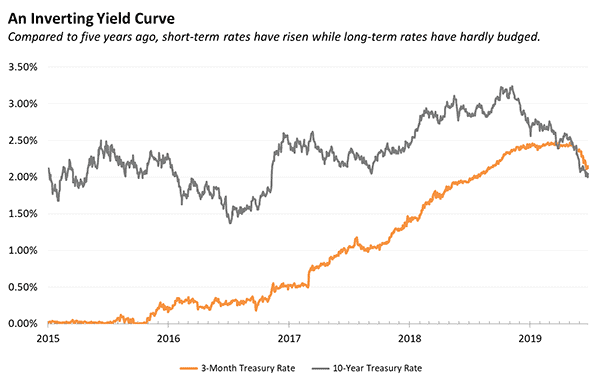
This Is a Red Flag for Banks
 The yield curve has been in the news because its recent gyrations are seen as a harbinger of a coming recession.
The yield curve has been in the news because its recent gyrations are seen as a harbinger of a coming recession.
The yield curve is the difference between short- and long-term bond yields. In a healthy economy, long-term bond yields are normally higher than short-term yields because investors take more risk with the longer duration.
In late June, however, the spread between the yield on the three-month Treasury bill and the 10-year Treasury note inverted—which is to say the 10-year yield was lower than the three-month yield.

An inverted yield curve doesn’t cause a recession, but it signals a set of economic factors that are likely to result in one. It is a sign that investors lack confidence in the future of the economy. Or to put it another way, they have greater confidence in the economy’s long-term prospects than in its near-term outlook.
Long-term yields drop because investors want to lock in a higher return. This heightened demand for long-dated bonds allows the U.S. Department of the Treasury to offer lower yields. The historical average length of recessions is about 18 months, so a 10-year Treasury note takes investors well beyond that point.
Short-terms Treasury yields rise because investors are skittish about the economy’s near-term prospects, which requires the Treasury Department to entice them with higher yields.
It turns out that inverted yield curves have a pretty good track record of predicting recessions within the next 12 months. The last six recessions were preceded by inverted yield curves, although economists point out that inversions in 1995 and 1998 were not followed by subsequent downturns. And more than two years passed between an inversion in December 2005 and the onset of the 2008 financial crisis.
Still, an inverted yield curve is an economic red flag for banks. The industry’s performance inevitably suffers in a recession, and even the most conservative institutions will experience higher loan losses when the credit cycle turns.
An inversion is a warning that banks should tighten their credit standards and rein in their competitive impulses. Some of the worst commercial loans are made 12 to 18 months prior to an economic downturn, and they are often the first loans to go bad.
Ironically, if banks tighten up too much, they risk contributing to a recession by cutting off the funding that businesses need to grow. Banks make these decisions individually, of course, but the industry’s herd instinct is alive and well.
It’s possible that the most recent inversion presages a recession in 2020. In its June survey, the National Association of Business Economics forecast the U.S. economy to grow 2.6 percent this year, with only a 15 percent chance of a recession. But they see slower growth in 2020, with the risk of a recession by year-end rising to 60 percent.
This has been an unprecedented time for the U.S. economy and we seem to be sailing through uncharted waters. On July 1, the economy’s current expansion became the longest on record, and gross domestic product grew at a 3.1 percent annualized rate in the first quarter. Unemployment was just 3.6 percent in May—the lowest in 49 years—while inflation, which often rises when the economy reaches full employment because employers are forced to pay higher salaries to attract workers, remained under firm control.
These are historic anomalies, so maybe the old rules have changed.
The Federal Open Market Committee is widely expected to cut the fed funds rate in late July after raising it four times in 2018. That could both help and hurt bankers.
A rate cut helps if it keeps the economic expansion going. It hurts if it makes it more difficult for banks to charge higher rates for their loans. Many banks prospered last year because they were able raise their loan rates faster than their deposit rates, which helped expand their net interest margins. They may not benefit as much from repricing this year if the Fed ends up cutting interest rates.
Is an inverted yield curve a harbinger of a recession in 2020? This economy seems to shrug off all such concerns, but history says yes.



